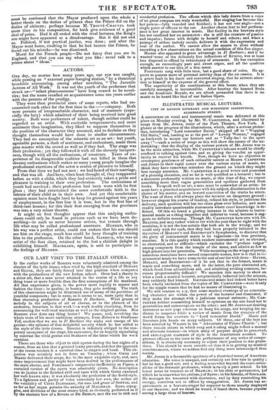OUR LAST VISIT TO THE ITALIAN OPERA.
IF the earlier works of Rosner were reluctantly admitted among the classics of the lyric drama when tried by the high standard of MOZART and Gram, they are fairly forced into that position when compared with the productions of the new Italian school. OPIE had a theory in a sister art, that a man never attained in the course of a life to any thing truer or more forcible than the first conceptions of his manhood. All that experience gives, is the power more rapidly to master and fashion the ideas ; in quality, in beauty, they gain nothing. The truth of this observation might be illustrated out of many of the partitions of youthful composers ; but in none, as it seems to us, more aptly than in that charming production of ROSSINI 11 Barbiere. What graces of melody in the subjects of air or chorus, or in the phrases of the orchestra, luxuriate in that work l—a work doubly charming, from its announcing the well-read musician as well as the original genius. Has ROSSINI ever done any thing better ? We pause, and, revolving the whole train of his more ambitious attempts, from Zebnira to Guillaume Tell, confess that we see in II Barbiere the alpha and omega of his genius—the epitome of that delightful novelty which he has added to the style of the lyric drama. ROSSINI is infinitely obliged to the tem- porary occupants of the stage, his successors, for so happily signalizing by contrast the vivid genius and freshness of the ideas which his work contains.
There are those who object to visit operas during the last nights of a season, from an idea that a general laxity prevails, and that the approach of the recess renders it a carnival-time to singers and band. This ob- jection was certainly not in force on Tuesday ; when Ginn and MARIO delivered their songs, &c. in the most exquisite style, and, save some improvement that might have been desired in the performance of the male chorus, and FORNISARIS comparative inefficiency as Figaro, a curtailed version of the opera was admirably given. No description can do justice to the finished skill and taste with which Gam executed her welt-known airs ; it was absolutely the perfection of the florid style. To a lightness and purity of voice essentially her own, she unites all the volubility of CINTI DAMOREAU, the ease and grace of SONTAG, and as far as her organ permits the audacity of MALIBRAN. Runs, arpeg- gios, and divisions of the most ornate kind, as distinctly performed as if by-the staccato bow of a &vont or DE Swam; met the ear in rich and wonderful profusion. The effects which this lady draws from a voice of no great compass are truly wonderfuL Her singing has become like her person—fully rounded and finished ; it has not one angle—not a single point of offence to the ear. Another charm lent to her perform- ance is her great interest in music. Her facility in the bravura style has not rendered her an automaton : she is still the creature of passion and impulse; listens with delight to herself and others; and when a passage of artless melody occurs, delivers it with the expression and soul of the author. We cannot allow the season to close without recording a few observations on the actual condition of this fine singer. MARIO also appeared to great advantage in 11 Barbiere; and if he wanted' some of the delicately fine inflections of RUBINI, was at least less disposed to offend by redundancy of ornament. He has execution enough, an exceedingly pure and sweet organ, and all the qualities which answer to our idea of a first tenor.
FORNISARI sang with little tone, but a good share of noise. He ap- pears to possess more of personal activity than of the vis cornice. It is a grave fault in his duets and concerted singing, that he attracts atten- tion to himself at the expense of the general effect.
The superiority of the combinations at this house, when they are carefully managed, is incontestible. After bearing the boasted Scala and the Academie Royale, we are afresh persuaded that there is no music to be heard like that of our Italian Opera.


























 Previous page
Previous page